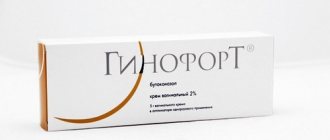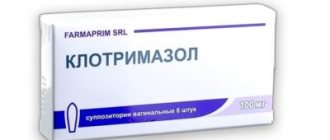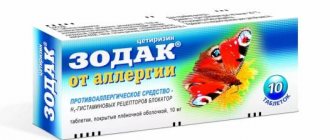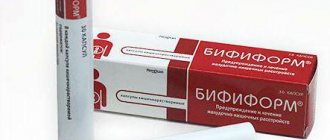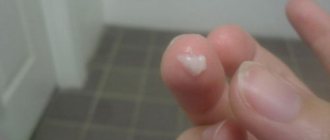Application for children
The medication can be prescribed to children over 3 years of age.
Age restrictions are due to the fact that a small child will not be able to dissolve the tablet. Even if Laripront is used by a child over 3 years old, problems may arise. If there are problems with the absorption of the medicine, you need to make a choice in favor of another medicine. Various sprays are excellent for treating throat diseases in children. The dosage of Laripront for children is the same as for adults. When using the medication, you need to ensure that the child completely absorbs the tablet. For acute diseases of the oral cavity and larynx, use 1 tablet every 2-3 hours. The drug can be combined with other medications. Sore throat in children needs to be treated comprehensively.
Indications and contraindications for the use of Laripront
So, the drug Laripront is recommended for infectious and inflammatory lesions of the oral mucosa, larynx and pharynx, that is, for exacerbation of pathologies such as gingivitis, pharyngitis, stomatitis, laryngitis, sore throat and periodontitis. Also, the use of Laripront is appropriate for hoarseness, hoarseness, and severe sore throat.
In addition, Laripront is often included in a rehabilitation regimen after surgical manipulations in the oral cavity and pharynx, for example, after removal of adenoids, surgery on the jaw or tonsils, etc.
Among the contraindications, one can highlight only the body’s hypersensitivity to certain components that make up this drug, but otherwise there are no restrictions.
What is it used for?
- stomatitis;
- tonsillitis;
- angina;
- laryngitis;
- pharyngitis.
The medicine copes equally well with any type of infection. Most often, throat diseases are caused by viral and bacterial pathogens. Laripront can also help with candidiasis.
For severe diseases, you will need to use the medicine internally. Laripront is a local remedy that can independently help with colds and uncomplicated acute tonsillitis. Viral sore throat will require complex treatment.
It is great for relieving a sore throat and starting therapy for an oral infection. If there is no therapeutic effect 3 days after starting use, you must consult a specialist and undergo an examination.
Analogs
There are no structural analogues of the drug based on the substances included in the drug. Doctors and pharmaceutical specialists, if patients are individually intolerant of the components, suggest using other drugs that are similar in action. Currently, pharmacies offer the following types of analogues:
- Abisil is an antimicrobial drug containing the main substance Siberian Fir terpenes;
- Apizartron is an anti-inflammatory ointment for topical use, refers to drugs with salicylic acid derivatives;
- Hexaliz is an antiseptic anti-inflammatory medicine for the local treatment of infectious diseases of the oral mucosa and nasopharynx;
- Lyzobact is an antiseptic for topical use, contains lysozyme hydrochloride;
- Strepsils is a drug for sore throat and nasal congestion, has a local antiseptic effect, contains essential oils;
- Falimint is a cough suppressant that has a local antiseptic effect;
- Elidel is an anti-inflammatory ointment.
Contraindications
The drug should not be used if there is an individual intolerance to any individual components of the drug. Also, before taking the drug, it is best to consult a doctor. It is imperative that you first undergo tank culture tests, which indicate the advisability of using Laripront.
The drug is usually well tolerated, but people with chronic respiratory diseases are at risk. For pathologies of the kidneys and liver, the antibacterial agent is taken under the supervision of doctors.
Allergic reactions often occur not to the drug itself, but to its shell. Otherwise, the tablet is diluted in a tablespoon of water, the contents of which are placed in the oral cavity for 10-15 minutes, after which it is spat out.
During pregnancy and lactation
The use of tablets in children is also allowed, since their high effectiveness has been clinically proven.
"LARIPRONT": analogues
Direct analogues of the active substance include medicines containing lysozyme:
Lyzobact is a Bosnian medicine with a multicomponent active composition, which includes lysozyme and pyridoxine. The tablets act as an antiseptic and are widely used in the treatment of acute respiratory viral infections of various etiologies, gingivitis, stomatitis, periodontitis, pharyngotonsillitis and other infectious viral lesions of the oral cavity. Price – from 270 rubles.
Hexalize are French lozenges based on lysozyme, biclotymol and enoxolone. Acts as an analgesic, antiseptic and anti-inflammatory. It is used in the treatment of infections and inflammatory lesions of the mucous membrane of the oropharynx and oral cavity. Price – from 240 rubles.
As an alternative, you can also use medications of a similar release form and similar indications for use. This list can include:
Septolete Neo – lozenges for resorption produced in Slovenia. Acting on the basis of cetylpyridinium chloride, they relieve pain symptoms in the larynx and inflammation of the oral mucosa. Price – 195 rubles. Strepsils are English lozenges based on dichlorobenzyl alcohol and amylmetacresol. Effectively act as an analgesic and anti-inflammatory agent in the treatment of infectious lesions of the larynx and oral cavity. Price – from 150 rubles. Neo Angin is a German-made tablet intended for resorption. Acting on the basis of a combination of amylmetacresol, levomenthol and dichlorobenzyl alcohol, they have an antiseptic and disinfectant effect in the treatment of ENT diseases and the oral cavity. Price – from 209 rubles.
Hexoral Tabs is an Indian antiseptic, produced in tablet form based on amylmetacresol and dichlorobenzyl alcohol. When absorbed, they relieve pain and inflammation in the treatment of pharyngitis, tonsillitis, stomatitis and gingivitis. Price – from 204 rubles.
Sebidine is a Polish pharmaceutical whose active ingredients are chlorhexidine and ascorbic acid. Acting as an antiseptic, it also has an antibacterial and bactericidal effect in the treatment of infectious and inflammatory diseases of the gums, larynx and oral cavity. Price – 162 rubles.
Laripront or Lizobact - which is better?
Both drugs are partially similar in composition: both contain lysozyme hydrochloride, which has a pronounced antibacterial effect. Both tablets are approved for pregnant and nursing mothers and are safe for children. Perhaps the only significant difference is a small difference in price - Lizobakt will cost a little more. In most cases, the decision to prescribe is made by the therapist, based on the medical history and individual characteristics of the patient’s body.
Laripront's analogs
Level 4 ATC code matches: Falimint
Suprima-ENT
Ingalipt N
Strepsils Plus
Strepsils
Ingalipt
Theraflu LAR
Lisak
Efizol
Isla Mint
Kameton
Anzibel
Agisept
Yox
Lugol's solution with glycerin
Lugol
Stopangin
Septolete Neo
Septolete D
Septolete Plus
The closest analogues: Hexaliz, Lizobakt, Alorom, Decathylene, Abisol, Apizartron, Epidel .
Laripront or Lizobact - which is better?
Unlike Laripront, its analogue has a slightly different set of active ingredients. It can be safely taken by pregnant and lactating women. It can be difficult to find the drug in a pharmacy; its cost is not much different from the original. Judging by the reviews, both products are effective and quite effective.
Pharmacological effects
In accordance with the instructions for Laripront, the active ingredients of the drug are dequalinium chloride and lysozyme hydrochloride. Excipients of the drug are magnesium stearate, povidone K25, anise and peppermint aromatic essence, sucrose.
Laripront is a local anti-inflammatory agent. It has antimicrobial, mucolytic, antifungal, antiviral and hemostatic properties.
Lysozyme hydrochloride is an enzyme that, due to the formation of a complex with viruses, has an antiviral effect.
The substance has an antimicrobial effect against gram-positive bacteria, resulting in mild and rapid destruction of the cell walls of microorganisms.
Dequalinium chloride is an antiseptic that is effective against gram-negative and gram-positive fungi and microorganisms. The drug reduces surface tension, thereby facilitating the penetration of the substance into the deep areas of the mucous membrane.
Laripront is practically not absorbed into the systemic circulation. Well absorbed by the gastrointestinal tract. Metabolized in the liver to form several metabolites. It is eliminated from the body to a greater extent through the kidneys. Laripront is also prescribed for children, since the medicine does not have a toxic effect on the body.
pharmachologic effect
Laripront is a combined drug, it combines synthetic dequalinium chloride and a natural protein enzyme that has an antibacterial effect.
Dequalinium chloride is effective against yeast-like fungi and candida, gram-positive and gram-negative microorganisms, and relieves swelling of inflamed tissues.
Lysozyme hydrochloride successfully defeats viruses, bacteria and infections. It is important that lysozyme is part of the body’s biological fluids: tears, saliva, mother’s milk, secretions that cover the outer mucous membranes of the genital organs, and provides it with natural and powerful protection.
Lysozyme, which is part of the medicine, is isolated from the protein of chicken and quail eggs. Therefore, Laripront is absolutely safe for pregnant and lactating women, and there are no barriers to its use by children.
The action of lysozyme, like other natural substances, is more “reasonable” - it does not kill all microflora, like a synthetic antibiotic, it destroys the structure of harmful bacteria and strengthens local immunity.
The inability of Laripront components to penetrate into the general bloodstream is another safety parameter for pregnant women.
Pharmacological group
Laripront tablets are a combination product intended for topical use. The effectiveness of the drug is determined by a number of actions that it produces. Laripront has an antimicrobial effect aimed at combating gram-positive and gram-negative microorganisms, as well as fungi. The product also has antiviral, hemostatic, mucolytic and anti-inflammatory effects.
Lysozyme hydrochloride has a destructive effect on gram-positive bacteria by disrupting their cellular structure. Dequalinium is classified as an antiseptic; it exhibits a high degree of activity in the fight against gram-positive and gram-negative microorganisms and fungi. The substance also helps relieve swelling and deepen the penetration of active ingredients into the mucous membrane.
There is no penetration into the systemic circulation.
Instructions for use of Laripront for children and adults during pregnancy and analogues
Osteochondrosis › Instructions for use Laripront for children and adults during pregnancy and analogues
22.10.2019
Laripront tablets are a combination product intended for topical use. The effectiveness of the drug is determined by a number of actions that it produces. Laripront has an antimicrobial effect aimed at combating gram-positive and gram-negative microorganisms, as well as fungi.
Lysozyme hydrochloride has a destructive effect on gram-positive bacteria by disrupting their cellular structure. Dequalinium is classified as an antiseptic; it exhibits a high degree of activity in the fight against gram-positive and gram-negative microorganisms and fungi.
There is no penetration into the systemic circulation.
Category ICD-10 Synonyms of diseases according to ICD-10
| J02.9 Acute pharyngitis, unspecified | Purulent pharyngitis |
| Lymphonodular pharyngitis | |
| Acute nasopharyngitis | |
| J03.9 Acute tonsillitis, unspecified (angina agranulocytic) | Angina |
| Sore throat, alimentary-hemorrhagic | |
| Sore throat secondary | |
| Primary tonsillitis | |
| Sore throat follicular | |
| Sore throats | |
| Bacterial tonsillitis | |
| Inflammatory diseases of the tonsils | |
| Throat infections | |
| Catarrhal sore throat | |
| Lacunar tonsillitis | |
| Acute sore throat | |
| Acute tonsillitis | |
| Tonsillitis | |
| Acute tonsillitis | |
| Tonsillar tonsillitis | |
| Follicular tonsillitis | |
| Follicular tonsillitis | |
| J04 Acute laryngitis and tracheitis | Infectious and inflammatory disease of ENT organs |
| Cough in diseases of the upper respiratory tract | |
| Laryngitis | |
| Laryngitis acute | |
| Acute tracheitis | |
| Pharyngolaryngitis | |
| K05 Gingivitis and periodontal diseases | Inflammatory gum disease |
| Inflammatory diseases of the oral cavity | |
| Gingivitis | |
| Hyperplastic gingivitis | |
| Oral disease | |
| Catarrhal gingivitis | |
| Bleeding from gums | |
| Exacerbation of inflammatory diseases of the pharynx and oral cavity | |
| Epstein cysts | |
| Erythematous gingivitis | |
| Ulcerative gingivitis | |
| K12 Stomatitis and related lesions | Bacterial stomatitis |
| Inflammatory diseases of the oral cavity | |
| Inflammatory diseases of oral tissues | |
| Inflammatory processes in the oral cavity | |
| Fungal diseases of the oral cavity | |
| Fungal infections of the mouth | |
| Fungal infectious and inflammatory diseases of the oral cavity | |
| Oral disease | |
| Infectious and inflammatory disease of the oral cavity | |
| Exacerbation of inflammatory diseases of the pharynx and oral cavity | |
| Recurrent ulcerative stomatitis | |
| Stomatitis | |
| Stomatitis | |
| Angular stomatitis | |
| Chronic recurrent stomatitis | |
| Erosive and ulcerative lesions of the oral mucosa | |
| Erosive and ulcerative lesions of the oral mucosa | |
| Erosion of the oral mucosa | |
| Ulcerative-necrotic diseases of the oral mucosa | |
| Ulcerative-necrotic diseases of the oral mucosa | |
| Ulcerative-necrotic lesions of the oral mucosa | |
| Ulcerative-necrotizing gingivostomatitis | |
| Ulcerative stomatitis |
Directions for use and doses
The medication is intended for resorption. It must be kept in the mouth or under the tongue until the tablet is completely dissolved. After using Laripront, you should not eat or drink for at least half an hour.
The drug is used until the condition improves.
for adults
Adult patients dissolve one tablet until completely dissolved every few hours (2-3 hours).
for children
In the case of treating children with the drug Laripront, the dosage is prescribed by the doctor individually to each child. The dosage regimen will depend on the patient’s age, the severity of the disease, as well as other individual characteristics.
For patients carrying a child and breastfeeding, a qualified specialist individually prescribes a dosage regimen.
Inside, 30 minutes before meals, 1 tablet. (keep in the mouth or under the tongue until completely dissolved) every 2–3 hours; Within 30 minutes after taking the tablet, you should refrain from eating or drinking.
Composition, release form, pharmacological action of Laripront
1 lozenge contains lysozyme hydrochloride 10 mg and dequalinium chloride 0.25 mg; 10 pcs in a strip pack, 2 packs in a box.
The packaging of the medicine contains two blister cells containing 10 tablets. Laripront consists of two components that exert their pharmacological effects:
- 0.25 mg dequalinium chloride. It is an antiseptic that kills germs, viruses, fungi, and relieves inflammation. Penetrates deeply into tissues, removes swelling.
- 10 mg lysozyme hydrochloride. The natural enzyme has a liquefying effect and combines with viruses to destroy them. Reduces inflammation, clears purulent mucus, promotes healing, models immunity, stops bleeding, restores tissue surface.
A special feature of Laripront is the combination of synthetic and natural substances. Lysozyme is extracted from egg white; its composition is similar to natural human fluids - saliva, tears, mother's milk.
The pills also contain other elements that can cause a reaction only if you are intolerant:
- 20 mg polyvidone;
- 15 mg magnesium stearate;
- 3.5 mg aromatics;
- sucrose.
special instructions
Children, as well as pregnant and lactating women, should take the drug as prescribed by a doctor.
The drug Laripront does not have any effect on a person’s ability to drive any type of vehicle, or engage in activities that require prolonged concentration and intensive use of cognitive abilities and attention. The product does not affect reaction speed or the ability to engage in extreme sports.
Storage conditions
Tablets must be stored in a place reliably protected from moisture and direct sunlight on the drug. The temperature in the room where Laripront is located should not exceed 25°C. Children's access to the medication should also be limited.
The shelf life of the drug is 36 months from the date of release. Use of the product after the specified period is prohibited.
At a temperature not exceeding 25 °C.
Keep out of the reach of children.
Shelf life of Laripront
3 years.
Do not use after the expiration date stated on the package.
Category ICD-10 Synonyms of diseases according to ICD-10
| J02.9 Acute pharyngitis, unspecified | Purulent pharyngitis |
| Lymphonodular pharyngitis | |
| Acute nasopharyngitis | |
| J03.9 Acute tonsillitis, unspecified (angina agranulocytic) | Angina |
| Sore throat, alimentary-hemorrhagic | |
| Sore throat secondary | |
| Primary tonsillitis | |
| Sore throat follicular | |
| Sore throats | |
| Bacterial tonsillitis | |
| Inflammatory diseases of the tonsils | |
| Throat infections | |
| Catarrhal sore throat | |
| Lacunar tonsillitis | |
| Acute sore throat | |
| Acute tonsillitis | |
| Tonsillitis | |
| Acute tonsillitis | |
| Tonsillar tonsillitis | |
| Follicular tonsillitis | |
| Follicular tonsillitis | |
| J04 Acute laryngitis and tracheitis | Infectious and inflammatory disease of ENT organs |
| Cough in diseases of the upper respiratory tract | |
| Laryngitis | |
| Laryngitis acute | |
| Acute tracheitis | |
| Pharyngolaryngitis | |
| K05 Gingivitis and periodontal diseases | Inflammatory gum disease |
| Inflammatory diseases of the oral cavity | |
| Gingivitis | |
| Hyperplastic gingivitis | |
| Oral disease | |
| Catarrhal gingivitis | |
| Bleeding from gums | |
| Exacerbation of inflammatory diseases of the pharynx and oral cavity | |
| Epstein cysts | |
| Erythematous gingivitis | |
| Ulcerative gingivitis | |
| K12 Stomatitis and related lesions | Bacterial stomatitis |
| Inflammatory diseases of the oral cavity | |
| Inflammatory diseases of oral tissues | |
| Inflammatory processes in the oral cavity | |
| Fungal diseases of the oral cavity | |
| Fungal infections of the mouth | |
| Fungal infectious and inflammatory diseases of the oral cavity | |
| Oral disease | |
| Infectious and inflammatory disease of the oral cavity | |
| Exacerbation of inflammatory diseases of the pharynx and oral cavity | |
| Recurrent ulcerative stomatitis | |
| Stomatitis | |
| Stomatitis | |
| Angular stomatitis | |
| Chronic recurrent stomatitis | |
| Erosive and ulcerative lesions of the oral mucosa | |
| Erosive and ulcerative lesions of the oral mucosa | |
| Erosion of the oral mucosa | |
| Ulcerative-necrotic diseases of the oral mucosa | |
| Ulcerative-necrotic diseases of the oral mucosa | |
| Ulcerative-necrotic lesions of the oral mucosa | |
| Ulcerative-necrotizing gingivostomatitis | |
| Ulcerative stomatitis |
Instructions for use of Laripront for children and adults during pregnancy and analogues Link to main publication
Source: https://lechim-vmeste.ru/instruktsiya-primeneniyu-laripront-detey-vzroslykh-beremennosti-analogi/
special instructions
There are no special instructions in the official instructions. The only thing that can be highlighted is that the drug should be used 30 minutes before meals or 10 minutes after. It is desirable that Laripront components remain in the area of inflammation for as long as possible.
The medication should be used only when necessary. Prevention can only be carried out before ENT operations. In order to prevent the development of throat diseases, you need to lead a healthy lifestyle, maintain your immune system and undergo regular examinations in the hospital.
If there is no effect, the drug must be replaced with another. There are very few infections that are not sensitive to Laripront, so it is almost always possible to achieve the desired result with its help.
Lozenges Laripront (Larypront)
Instructions for medical use of the drug
Description of pharmacological action
Combined preparation for local use. It has an antimicrobial effect against gram-positive, gram-negative microorganisms, fungi and an antiviral effect, as well as anti-inflammatory, hemostatic (hemostatic) and mucolytic (sputum thinning) effects.
Indications for use
Bacterial and fungal infectious and inflammatory diseases of the oral cavity, pharynx and larynx (stomatitis, pharyngitis, laryngitis, tonsillitis, tonsillitis, thrush, etc.); before and after dental and ENT operations.
Release form
lozenges; contour packaging 10 cardboard pack 2;
Use during pregnancy
During pregnancy and lactation (breastfeeding), the drug can be used according to indications.
Contraindications for use
Hypersensitivity.
Side effects
Allergic reactions.
Directions for use and doses
Inside, 30 minutes before meals, 1 tablet. (keep in the mouth or under the tongue until completely dissolved) every 2–3 hours; Within 30 minutes after taking the tablet, you should refrain from eating or drinking.
Overdose
Due to the low systemic absorption of the drug, an overdose is unlikely.
Interactions with other drugs
No clinically significant interaction of Laripront with other drugs has been established.
Special instructions for use
The drug Laripront does not affect the ability to drive vehicles or operate machinery.
Storage conditions
At a temperature not exceeding 25 °C.
Best before date
36 months
ATX classification:
R Respiratory system
R02 Preparations for the treatment of throat diseases
R02A Preparations for the treatment of throat diseases
R02AA Antiseptics
R02AA20 Other drugs
Analogues of the drug Laripront
For the treatment of acute pharyngitis, analogues are prescribed:
- Sumamed forte.
- Morenasal.
- Terzef.
- Hexaspray.
- Glycodin.
- Panclave.
- Pinosol.
- Ceftriabol.
- Flemoklav Solutab.
- Doxycycline.
- Grunamox.
- Erespal.
- Smallpox.
- Naklofen.
- Faringosept.
- Aqua Maris.
- Galavit.
- Grammidin with neo anesthetic.
- Grammidin.
- Hexoral.
- Sebidin.
- Lysobacter.
- Levopront.
- Imudon.
- Septolete D.
- Fromilid.
- Miramistin.
- Xylometazoline.
- Polydex with phenylephrine.
- Bioparox.
- Amoxicillin.
- Strepsils.
- Drill.
- Vilprafen.
- Hexapneumin.
- Clindamycin.
- Ciprofloxacin.
- Lidaprim.
- Ampicillin.
- Falimint.
- Paxeladine.
- Sextaphage.
- IRS 19.
- Tonsilgon N.
- Unidox Solutab.
- Suprax.
- Sage.
- Liprokhin.
- Piprax.
- Erythromycin phosphate.
- Ribomunyl.
- Stopangin.
- Bactrim.
- Clarithromycin.
- Ofloxacin.
- Ospamox.
- Tantum Verde.
- Isofra.
- Biseptol.
- Nalgesin.
Indications for use
The drug Laripront is used in the fight against bacterial and fungal infections of the oral cavity, larynx and pharynx, and is also used before and after dental surgeries, as well as ENT surgeries.
for adults
For adult patients, there are a number of disorders for which the drug Laripront is prescribed, including:
- preventive measures to avoid colds;
- periodontitis;
- laryngitis;
- pain in the throat;
- gingivitis;
- pharyngitis;
- hoarseness;
- stomatitis;
- candidiasis;
- angina.
The medication is also used before and after dental surgeries affecting the jaw, tonsils and maxillary sinuses. This reduces the likelihood of patient infection during surgery.
for children
There are no age restrictions on taking Laripront. Indications for use are identical to those for adult patients.
for pregnant women and during lactation
There is no prohibition on the use of the drug by pregnant women or those who are in the lactation period. For pregnant women, the drug is used for:
- preventive measures aimed at preventing the occurrence of colds;
- periodontitis;
- laryngitis;
- pain in the throat;
- gingivitis;
- pharyngitis;
- hoarseness;
- stomatitis;
- candidiasis;
- sore throat;
- severe staphylococcal infections.
In the case of treatment of severe staphylococcal infections in pregnant women, the medication is used as part of combined therapeutic actions as a local treatment. This approach makes it possible to reduce the number of systemic drugs used.
Indications for use of Laripront
According to the instructions, Laripront is used for:
- Prevention of colds;
- Periodontitis;
- Pharyngitis;
- Laryngitis;
- Sore throat and hoarseness;
- Gingivitis;
- Stomatitis, including candidiasis;
- Sore throat.
Also, according to the instructions, Laripront is used before and after dental operations on the jaw, operations on the tonsils and maxillary sinuses to prevent infections.
In the treatment of severe streptococcal infections during pregnancy, Laripront is used as part of combination therapy as a local treatment, which allows reducing the use of systemic drugs.
"LARIPRONT": composition
The Egyptian drug Laripront, the price of which is about 190-200 rubles, operates on the basis of two active components:
- lysozyme hydrochloride is a white powdery substance of natural origin; produced from chicken egg white and has antibacterial, mucolytic and anti-inflammatory pharmacological effects;
- dequalinium chloride is an antiseptic in the form of a white powder, which is a product of a biquaternary ammonium compound, which has a local bacteriostatic antibacterial and fungicidal effect.
The drug is available in the form of round tablets intended for resorption. Sold in cardboard boxes of 2 plastic blisters, each blister contains 10 pills.
How does it affect the body? (Pharmacodynamics)
The multicomponent composition of the drug determines its anti-inflammatory, mucolytic, antiviral and antimicrobial effect. The medicine has a local effect on the pharynx, larynx and oral cavity.
Lysozyme hydrochloride, being an enzyme of a group of hydrolases, destroys the membranes of gram-positive bacterial cells by hydrolysis.
In addition, it has moderate anti-inflammatory, mucolytic and hemostatic effects. It has high absorption, reaching high concentrations in the gastrointestinal tract after one and a half hours after administration.
Dequalinium chloride belongs to the group of potent antiseptics. Active against gram-positive and gram-negative bacteria, viruses and fungi. Additionally, it relieves swelling and inflammation of the mucous membrane, and also has a weak hemostatic effect.
"LARIPRONT" indications for use:
Lozenges are prescribed for the treatment of:
- pharyngitis (acute and chronic);
- laryngitis (acute and chronic);
- tonsillitis (acute and chronic, agranulocytic tonsillitis);
- periodontitis;
- stomatitis;
- gingivitis;
- oral thrush;
- as well as before and after surgical intervention on the pharynx or oral cavity.
Contraindications
According to the instructions for use, Laripront lozenges are contraindicated in cases of individual intolerance to the components included in their composition.
It is allowed to take tablets during pregnancy and breastfeeding, both as monotherapy and in the complex treatment of colds, but only with the permission and under the supervision of a doctor.
Side effects
The manifestation of side effects in the form of mild allergic reactions is observed as a result of violation of the rules of administration or with increased sensitivity to the composition of the drug.
LARIPRONT: reviews
Good day to everyone who stopped by! In this review, I would like to tell you about my experience in treating stomatitis with Laripront, which was recommended to me at the pharmacy as a strong and effective antiseptic. Stomatitis is a disease of the oral cavity, inflammation of the mucous membrane on the inner surface of the cheeks, gums, and tongue. The disease is accompanied by the formation of wounds and ulcers. The disease is infectious, so the symptoms of inflammation do not go away on their own. Treatment is needed. Unfortunately, I did not have the opportunity to see a doctor, and stomatitis caused not only terrible discomfort, but also severe pain in the throat area, since the ulcer appeared there, almost near the tonsils. I ruled out a sore throat after some time, since with a sore throat there is usually a high temperature, and I …
Contraindications and side effects
- redness;
- itching and pain;
- increased symptoms of the underlying disease.
Allergies occur extremely rarely. If you are hypersensitive to this drug, you need to select another drug for local action.
Among the side effects, only an allergic reaction stands out. Its occurrence can be prevented by performing an allergy test. To do this, take half the tablet for the first time. If no unpleasant symptoms occur, then you can continue using Laripront.
If a person is hypersensitive to medications, you should consult a doctor before starting use. The specialist will take into account the individual characteristics of the person and select the right medicine with the most suitable dosage.
Instructions for use Laripront, dosage
The tablet is placed under the tongue and held until completely dissolved. The drug should be taken at least half an hour before meals or earlier.
The standard dosage of Laripront tablets, according to the instructions for use, is 1 pc. every 4 hours. The dosage for children is determined by the doctor individually.
Side effects
The instructions warn about the possibility of developing the following side effects when prescribing Laripront tablets:
- Allergic reactions to the components of the drug.
Contraindications
It is contraindicated to prescribe Laripront in the following cases:
- Individual intolerance or hypersensitivity to the components of the drug.
With caution - pregnancy and lactation.
Overdose
There is no data on overdose with tablets to date.
Storage conditions and periods
The drug Laripront should be stored out of the reach of children. The best temperature for storage is 25-30 degrees, no more.
Typically, after opening the production packaging, the drug will be valid for 28-30 days. Then it is better not to use it. If the original packaging has not been damaged, then it can be stored for up to 3 years in a closed, dark room.
Do not use the medicine if the packaging has been damaged or the contents have been left open for a long time.
The tablets are available without a prescription, but require medical advice. Self-medication may be ineffective, aggravating the course of the inflammatory process.


